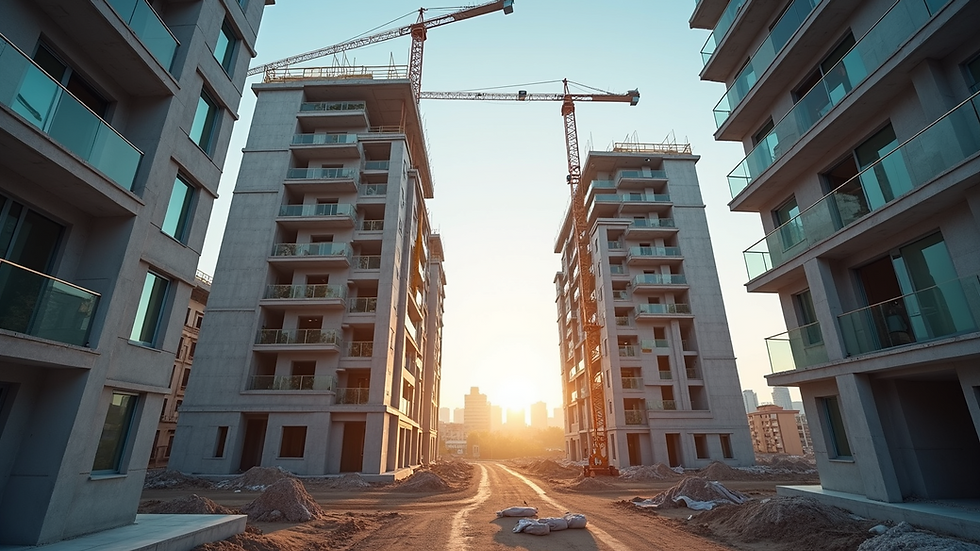Basics of Residential Property Development
- adambrill
- Oct 13, 2025
- 3 min read
Residential property development demands precision, knowledge, and strategic planning. I approach every project with a clear focus on delivering value and quality. This guide breaks down the essentials of property development basics. It equips you with practical insights to navigate the process confidently.
Understanding Property Development Basics
Property development basics start with a solid foundation in planning and execution. I prioritise thorough research and feasibility studies before committing to any project. This step identifies potential risks and opportunities early.
Key elements include:
Site selection: Choose locations with growth potential and good infrastructure.
Budgeting: Set realistic budgets covering land, construction, permissions, and contingencies.
Design: Align architectural plans with market demand and local regulations.
Permissions and approvals: Secure all necessary permissions to avoid delays.
Construction management: Oversee timelines, quality, and costs rigorously.
Each phase requires attention to detail and proactive problem-solving. I recommend creating a detailed project timeline with milestones to track progress effectively.

Careful planning ensures smooth construction phases.
What is Property Development?
Property development is the process of improving land or buildings to increase their value. It involves buying land or existing properties, designing or redesigning structures, and managing construction to create homes that meet market needs.
The process includes:
Acquisition: Identifying and purchasing suitable land or property.
Planning: Designing the project and obtaining planning permission.
Financing: Securing funds through loans, investors, or personal capital.
Construction: Building or renovating according to plans.
Marketing and sales: Selling or leasing the finished properties.
I focus on balancing cost, quality, and timing to maximise returns. Understanding local market trends and regulations is crucial. For example, in the Somerset-Wiltshire area, traditional designs often appeal to buyers, but modern touches really add value.

Detailed planning drives successful property development.
Navigating Legal and Regulatory Requirements
Compliance with planning approvals and building regulations is non-negotiable. I ensure every project meets planning conditions, building regulations, and environmental standards.
Steps to manage legal requirements:
Consult local planning authorities early.
Hire experienced architectural designers and surveyors.
Prepare and submit detailed planning applications.
Address any objections or conditions promptly.
Obtain building regulations approval before starting construction.
In South West England, planning requirements can vary between councils. Staying informed and maintaining good communication with officials streamlines approvals.
Financing Your Development Project
Securing the right financing is a cornerstone of success. I recommend exploring multiple funding sources to find the best fit:
Traditional & Self Build mortgages: Suitable for smaller projects with clear income streams.
Development loans: Short-term loans tailored for construction phases.
Private investors: Partnerships can provide capital but require clear agreements.
Grants and incentives: Check for local government schemes supporting housing development.
Create a detailed financial plan including all costs and expected revenues. Monitor cash flow closely to avoid surprises. I always build a contingency fund of at least 10% of the total budget.

Accurate budgeting and financing secure project stability.
Maximising Value Through Design and Construction
Design and construction quality directly impact the final value. I advocate for designs that blend functionality, aesthetics, and sustainability. This approach attracts buyers and enhances long-term appeal.
Tips for maximising value:
Use energy-efficient materials and systems.
Incorporate flexible living spaces.
Respect local architectural styles and materials while adding modern features.
Choose reputable builders/ sub-contractors with proven track records.
Monitor construction quality regularly.
Investing in good design and craftsmanship pays off. It reduces maintenance costs and increases market desirability.
Moving Forward with Confidence
Mastering property development basics empowers you to create successful residential projects. I encourage you to plan meticulously, comply with regulations, secure solid financing, and prioritise quality design and construction.
For those interested in expert guidance, residential property development services can provide tailored support. This ensures your project aligns with your vision and market demands.
Start your development journey with clarity and confidence. The right approach transforms ideas into inspiring, valuable homes.




Comments